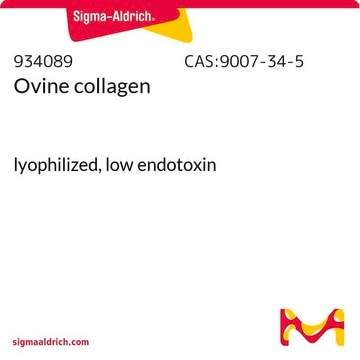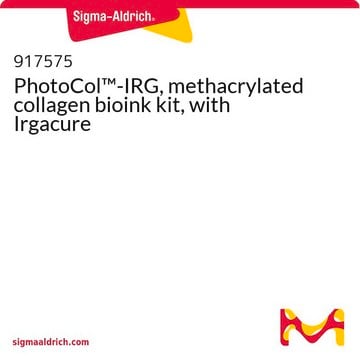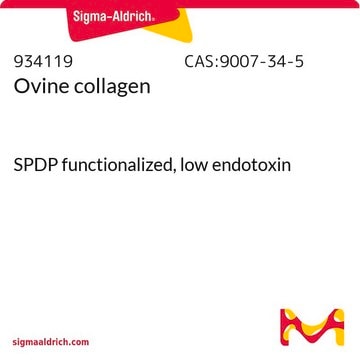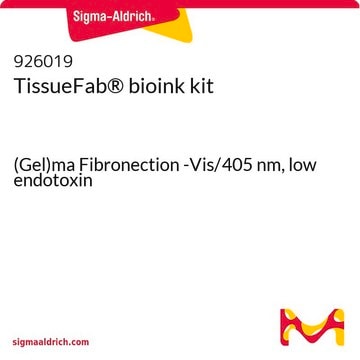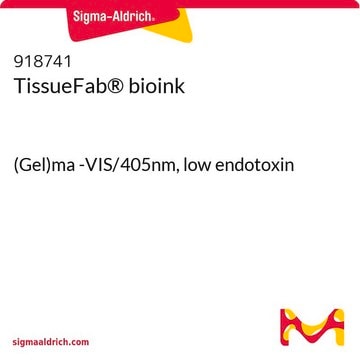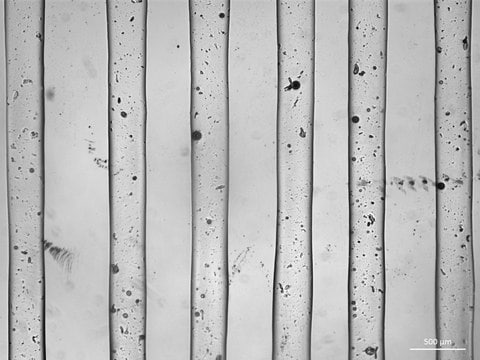934070
Ovine collagen
3 mg/ml solution, low endotoxin
Synonyma:
CollOvine™ RD
Přihlásitk zobrazení cen stanovených pro organizaci a smluvních cen
About This Item
Doporučené produkty
Quality Level
form
liquid
impurities
low endotoxin
≤100 EU/g Endotoxin (collagen)
pH
2.5-4
density
1.01 g/mL± 0.02 g/mL
Související kategorie
General description
Collagen is a major component of the extracellular matrix (ECM) and offers low immunogenicity, a porous structure, good permeability, and biocompatibility to promote cell viability, adhesion, spreading, proliferation and differentiation. Low endotoxin ovine collagen solution is derived from sheep and is a bovine or porcine alternative that is highly purified, fully traceable, and low endotoxin making it suitable for many biomedical applications.
Application
- 3D bioprinting
- Tissue engineering
- Drug delivery
- Regenerative medicine
- Cell culture, encapsulation, expansion and differentiation
Features and Benefits
- Certified Disease Free Sheep
- 93-97% Type I Collagen
- 3-7% Type III Collagen
- 99% Purity
- Prion Free
Legal Information
CollOvine is a trademark of OviGenex LLC
related product
Č. produktu
Popis
Stanovení ceny
Storage Class
12 - Non Combustible Liquids
wgk_germany
nwg
flash_point_f
Not applicable
flash_point_c
Not applicable
Osvědčení o analýze (COA)
Vyhledejte osvědčení Osvědčení o analýze (COA) zadáním čísla šarže/dávky těchto produktů. Čísla šarže a dávky lze nalézt na štítku produktu za slovy „Lot“ nebo „Batch“.
Již tento produkt vlastníte?
Dokumenty související s produkty, které jste v minulosti zakoupili, byly za účelem usnadnění shromážděny ve vaší Knihovně dokumentů.
Egor Olegovich Osidak et al.
International journal of bioprinting, 6(3), 270-270 (2020-10-23)
Biomaterials made using collagen are successfully used as a three-dimensional (3D) substrate for cell culture and considered to be promising scaffolds for creating artificial tissues. An important task that arises for engineering such materials is the simulation of physical and
Elizabeth E Antoine et al.
Tissue engineering. Part B, Reviews, 20(6), 683-696 (2014-06-14)
Type I collagen hydrogels have been used successfully as three-dimensional substrates for cell culture and have shown promise as scaffolds for engineered tissues and tumors. A critical step in the development of collagen hydrogels as viable tissue mimics is quantitative
Jana Stepanovska et al.
Biomedicines, 9(9), 1137-1137 (2021-09-29)
Bioprinting is a modern tool suitable for creating cell scaffolds and tissue or organ carriers from polymers that mimic tissue properties and create a natural environment for cell development. A wide range of polymers, both natural and synthetic, are used
Atiqah Salleh et al.
Biomedicines, 10(4), 816-816 (2022-04-24)
Tissue engineering products have grown rapidly as an alternative solution available for chronic wound and burn treatment. However, some drawbacks include additional procedures and a lack of antibacterial properties that can impair wound healing, which are issues that need to
Náš tým vědeckých pracovníků má zkušenosti ve všech oblastech výzkumu, včetně přírodních věd, materiálových věd, chemické syntézy, chromatografie, analytiky a mnoha dalších..
Obraťte se na technický servis.